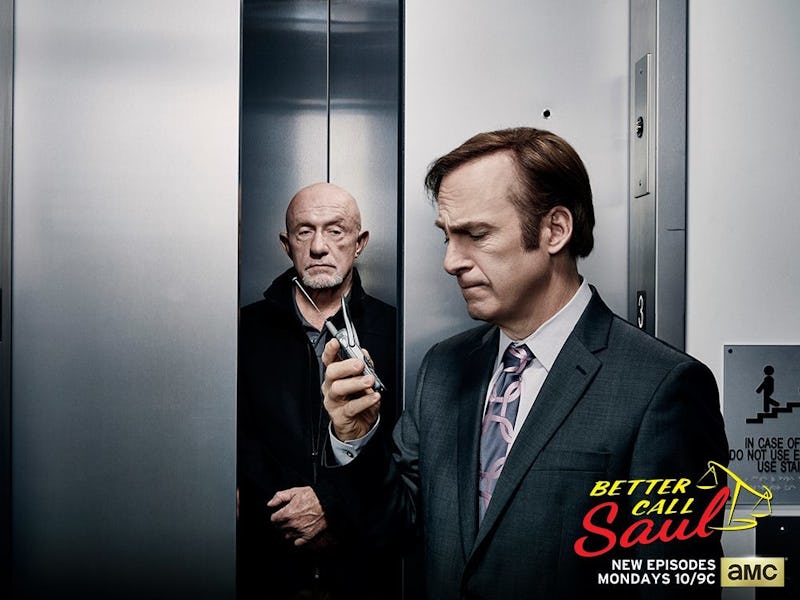5 Things 'Better Call Saul' Does Better Than 'Breaking Bad'
How Slippin' Jimmy pulls one over on Walter White.

A spinoff of Breaking Bad seemed like a bad idea when it was first announced in 2013. Why ruin the seemingly spotless run of AMC’s hit show with a hacky, opportunistic, tangentially related series?
Thankfully, Better Call Saul was never supposed to be Breaking Bad 2. Instead its comic-tragic story, tracing the transformation of heartfelt con man Jimmy McGill into the sleazy lawyer named Saul Goodman, didn’t ruin Walter White’s legacy, but instead, solidified it by expanding its southwestern mythology.
Better Call Saul isn’t an all-time great quite yet, but the necessary ingredients are there. It even beats the original source show in a few areas, too, especially when you consider that it took the original several seasons to become a smash hit. Here’s how Better Call Saul is already ahead of the game.
5. It’s allowed to be funny.
Better Call Saul is well aware of the parameters of its storyline. This isn’t to say Breaking Bad operated on some kind of untethered narrative path. On the contrary, it was perhaps the most simultaneously unwieldy show that always managed to pull itself back from the dramatic edge because of its character moments. For all the savagery at the heart of its characters, it was also funny, and populated its cast with comedians like Bill Burr and Bob Odenkirk (now the star of Better Call Saul). But it was always beholden to the main drama of Walter White breaking bad, and if it wavered too close to the funny stuff it ran the risk of becoming too much of a farce. Better Call Saul is free to be a farce that wades into its narrative to show the inherent sadness in that comedic perspective.
4. It has confident pacing.
Much of the criticism of Better Call Saul revolves around its slow movement. Take, for instance, Mike’s storyline in season 2. Essentially, all he does is join up with Nacho, get into a scuffle with Tuco, get into a confrontation with Tio, and then decide against killing Nacho and Tio at the last second in the season finale. But the slow pace is actually a good thing. Better Call Saul is able to take its time with its characters because it has the confidence to get its dramatic hooks out of gradual self-realizations. Aside from select bottle episodes of Breaking Bad, like director Rian Johnson’s now classic Fly, that show moved at a breakneck speed, and was peppered with make or break situations that changed the course of characters’ lives in split seconds.
3. The violence resonates more.
Breaking Bad was also known for its brief moments of ultra-violence. Everything from Walt and Jesse burning a body in acid in Jesse’s bathtub in season 1, to Gus Fring’s “face-off in season 4, and finally to Walt’s grisly machine gun stunt against the Nazi gang members in season 5 were more than ample evidence that Breaking Bad took things to the extreme. There are some very bad people in Better Call Saul but they aren’t able to carry out the same acts of violence with reckless abandon like their counterparts in Breaking Bad. This kind of knowing ability to withhold violence makes the momentary brutality in the show even more severe. Mike’s fight with Tuco in the middle of season 2, leaving him bruised and swollen for a few episodes, is even more vicious than any bloody confrontation Breaking Bad could have cooked up.
2. It has a more dynamic cast.
Breaking Bad’s main focus was squarely on Walt and Jesse. Sure, it expanded its ensemble by fleshing out characters like Hank, Skyler, Gus, and even Walt Jr. in ways that only someone like series creator Vince Gilligan can seem to pull off in a television show. But they were always firmly supporting characters. The characters Better Call Saul has introduced have all grown rapidly in prominence, especially Kim. Early on in the show she was merely hanging on to Jimmy’s coattails, but in her move out of HHM she’s emerged as the series’ third main character. Even the others like the endlessly plotting Nacho are more than simple supporting cast, and are far more compelling in only two seasons than Breaking Bad’s full five seasons.
1. The stakes aren’t life and death.
Walter White was chasing death. His illness gave him a finite amount of time to amass his illegal fortune to leave to his family before his body succumbed to the cancer. It gave the events of Breaking Bad an acute urgency that Better Call Saul doesn’t have to deal with. And it’s ultimately better off because of it. Instead of this literal mortal drama, Better Call Saul is a superficially simple story about a lovable loser trying to become a lawyer. But deep down it’s a fascinating portrait of a wayward soul trying to find his identity through relationships with the ones he loves. Breaking Bad was about a guy who’s inherently a monster, and it only took some simple greed to uncover that and make way for his descent. Better Call Saul is a more complicated story with stakes that are less dire but far more resonant.